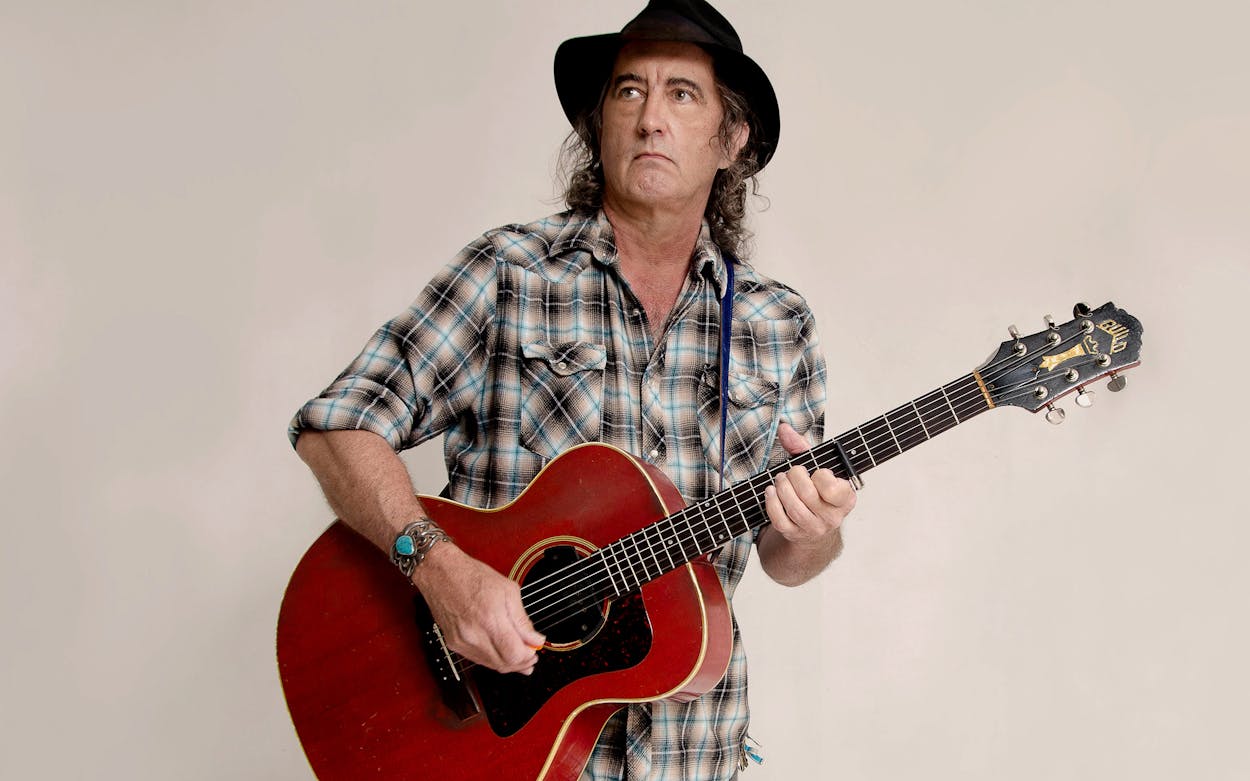James McMurtry has always been sixty years old. He was sixty when he released his debut album Too Long in the Wasteland in 1989. He was sixty in 2002, when he wrote his biggest hit, “Choctaw Bingo,” and in 2005, when he released Childish Things, the Americana Music Association Album of the Year. Even 2008’s Just Us Kids was created by a sixty-year-old kid. He appeared to be a sexagenarian in 2009, when he sported long, curly gray hair and a salt-and-pepper goatee, and even today, a year shy of his actual sixtieth, clean-shaven and with shorter locks, he seems not to have aged a day.
I ran this idea by Gordon Keith, cohost of The Musers, the top-rated morning radio show on The Ticket in Dallas, and a McMurtry superfan, and he chuckled in agreement. “I swear he went from third trimester in utero to world-weary. He’s always had the acute sense of observation of a much older person,” Keith said. One of his favorite McMurtry tunes, 1992’s “Where’s Johnny?” about a bright student becoming aimless once he gets to college, features plenty of that world-weariness Keith talks about: “His mother keeps his pictures / In the scrapbook in the drawer with her pearls / She polishes the trophies / That he won back when they thought he’d save the world.”
Sixty years old is an age of wisdom. You’ve loved and lost (McMurtry’s father, the legendary writer Larry, died in March), you’ve succeeded and failed. You’re cynical but still hopeful, nostalgic but still able to look to the future. At sixty, you’re pricklier in some ways, more empathetic in others. The aches and pains are there but aren’t stopping you from living your life. All of these elements have been present in McMurtry’s music from the beginning. John Mellencamp once said McMurtry writes like “he’s lived a lifetime.” He said that when McMurtry was 27.
For more than three decades, McMurtry has written with the wisdom and experience of someone well beyond his years. So, when it comes to his latest album The Horses and the Hounds, his first release in seven years: How do you write about someone whose physical age is catching up with his spiritual one? When does an artist cross over from possessing precocious abilities into possessing abilities exactly in line with his age? And, more specifically, is McMurtry about to hit his peak around the same age most artists become legacy acts?
Country music, specifically of the singer-songwriter genre, lends itself to the older artist. Truly good country music, the kind that gets called Americana so that it doesn’t play on the Nashville radio stations, requires truth—and truth requires experience. McMurtry’s music has always had that quality to it. Yet, The Horses and the Hounds is a more youthful-sounding album than anything he’s put out since the nineties. The storytelling and lyrics that cut right through you are still there. The characters are older, more regretful, and nostalgic. “There’s more in the mirror than there is up ahead,” he sings on “If It Don’t Bleed.” As you can expect, he’s going to break your heart, as on “Jackie,” with its tragic twist at the end. He’s still railing against the Middle East wars and how we neglect our soldiers, like on “Operation Never Mind”: “Lord don’t they look the best / When we trot them out at halftime / Or the seventh inning stretch / They stand up in their uniforms and help us sell the show / Dying by their own hands for reasons we don’t know.”
But it’s the music surrounding the lyrics that makes the album a rollicking good time. The title track is a fuzzed-up, electric guitar–driven Southern rock groove that wouldn’t be out of place on a Black Crowes album. “What’s the Matter” and “If It Don’t Bleed” could fit right in on a Mellencamp release. No surprise, then, to find in the credits producer Ross Hogarth, who served as a sound engineer for both Mellencamp and the Black Crowes, and longtime Mellencamp guitarist David Grissom. Sonically, The Horses and the Hounds fits much more with McMurtry’s first two albums, Too Long in the Wasteland and 1992’s Candyland, both of which featured Hogarth as a sound engineer.
It’s almost as if the more upbeat, rocking compositions are there to obscure the fact that McMurtry is no longer a young man who sounds like an old man, but a man who sounds exactly his age. He’s always infused his songs with humor, but now some of that humor hits really close to home for the older crowd. The chorus of “Ft. Walton Wake-up Call” is McMurtry repeating “I keep losing my glasses” over and over again.
That’s where the McMurtry who used to write mature songs well beyond his years and the McMurtry of today diverge. As old as he may have seemed when he was writing songs in his thirties, he wasn’t actually sixty; he likely never would’ve thought to write a lyric about misplacing his bifocals. There’s nothing that can replace the real experiences of actually living those years. Out of that experience comes even more truth, even if that truth is something as silly as losing one’s glasses. After a lifetime chasing aged wisdom, maybe the truest sign of it isn’t offering nostalgic vignettes and world-weary couplets but recognizing and reveling in life’s trivialities.
The narrator on the album’s single “Canola Fields” puts it best: “You can’t be young and do that.”
- More About:
- Music
- James McMurtry
- Fort Worth
- Austin






